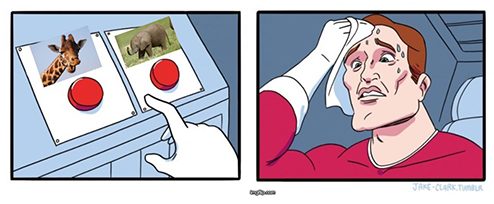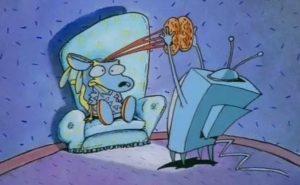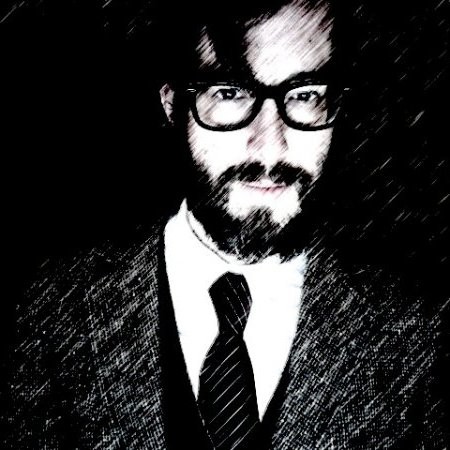The Illusion of Choice
Sometimes too many choices is the same as no choice at all
About a year ago I was in a subway station in Manhattan, traveling as I do from one point to another, when in the course of a transfer I was accosted by a young woman with a clipboard. She was wearing a shirt emblazoned with some company logo — which one, I can’t remember, but this was the station next to Google’s westside HQ, the same one plastered with ads imploring commuters to “let Google do it for you” — and I remember making eye contact with her well before we were anywhere near a social distance from one another. Spurred by this connection, she quickly approached me.
The last time this happened, I was given a quiz about primary colors, and because I hate tests I did my best to break contact and make for the next train. She caught up with me though: “Which would you rather have for a pet, a giraffe or an elephant?”

Original comic by Jake Clark
My mind raced. I was maybe 30 feet from the platform stairs. I had no room for either animal in our house and doubted my partner or neighbors would approve of keeping them in the driveway. New York City seemed like the wrong climate for sub-Saharan wildlife anyway. Fifteen feet left. Two choices. I was compelled to offer something in response, and the young woman at my heels could sense it. Then I remembered something I read in media scholar Douglas Rushkoff’s humanist treatise Program or Be Programmed: Ten Commandments for a Digital Age.
“Neither!” I replied.
The woman stopped in her tracks. “But you have to choose one!” She yelled after me.
“You can always choose none of the above,” I called back over my shoulder, quoting from the book, before jumping down the stairs to my ride home.
The spaces in between
On the train, I found myself thinking about all the choices we make in this life — the easy, binary, decision points that comprise so much of our experience of the world — the kind we hardly give a second thought to in the morning or throughout the course of our day: Shorts or pants? Flats or heels? Black or room for cream? Left or right? Up or down? Stay or go? To be or not to be?
In one sense, binary decision-making is comforting because it’s balanced and your odds of success are pretty good, because you can be pretty sure that something will come out of your process (even if it’s nothing). When it comes to getting dressed in the morning or how you take your coffee, there’s nothing inherently wrong with this way of thinking. It’s only when you apply binary thinking to every decision that you limit your experience by allowing external forces to do the thinking for you.
Ruskhoff is fond of the adjective liminal. It means “occupying a position at, or on both sides of, a boundary or threshold.” As humans, we currently occupy the liminal space between analog and digital technology. We live in the “real” world — a messy realm of skin, bone, and uncertainty — but an increasing amount of our headspace is occupied by a strict digital order. “The digital realm is biased toward choice, because everything must be expressed in the terms of a discreet, yes-or-no, symbolic language,” he writes. “This, in turn, often forces choices on humans operating within the digital sphere.”
The very definition of “digital” is the expression of a signal or data set as a series of the digits 0 and 1. There is no liminal space, and even when we are faced with a plethora of binary decisions, it’s no substitution for the continuously variable possibilities of the human experience because we only have as much choice as a programmer — working as they do in a limited digital environment — is capable of giving us.

The author, a digital native © Nickelodeon.
Another thing that occupied my thoughts at the time was a creeping aversion to watching films and television, particularly online. As a new parent who worked from home and was still trying to maintain some semblance of a creative life, my entertainment options had dwindled considerably, leaving my only consistent access through streaming platforms like Netflix, Amazon, and Hulu — all but housebound in the last year, I’d binged every episode of Magnum, p.i., Seinfeld, Star Trek: TNG, The Clone Wars, The Sopranos, and (at that time) five seasons of Game of Thrones.
But more and more recently, I found myself staring at the projector or computer screen, scrolling through menu after menu of seemingly endless entertainment possibilities and being excited by none of them. There was no shortage of films and TV shows that I was repeatedly told by friends that I had to watch, and there these films and shows sat on my watch lists, unwatched. None of Netflix’s suggestions made any sense or held any interest for me. Meanwhile, Amazon advertised their Fire TV service as offering more than 200,000 movies and TV episodes. I literally had more entertainment at my fingertips than I knew what to do with. What was my problem? Isn’t more choice what I was paying for?
Then I remembered something else from Ruskhoff’s book, something about having more choices not necessarily being better. It’s not a matter of being overwhelmed by choice — like the way one feels when shopping at a big box store — it’s about being hemmed in. “Choice stops us, requiring that we make a decision in order to move on,” he writes. “The one choice we’re not getting to make is whether or not to deal with all this choice.”
Rushkoff goes on to address the way our interactive lives are mined for consumer research, how our clicks are “measured and compared, our every choice registered for its ability to predict and influence the next choice.” And the more we turn our decision-making processes over to the Algorithm, the less agency we truly have, because we’re only working with whatever the Algorithm chooses to present us with — which is usually more of what it calculates we already like — that is, more of the same.
Damming the stream
Not long after this experience, I ended up canceling most of my streaming accounts (I kept one). I started reading a lot more. I spent more time outside with my family and friends. And now, when I do watch movies and TV, I make the effort to look outside my comfort zone for things that never would’ve been anticipated by my normal viewing habits. I still haven’t seen any of Stranger Things, Orange Is the New Black, BoJack Horseman, GLOW, Dark, Master of None, Kimmy Schmidt, Cobra Kai, Transparent, Better Call Saul, Westworld, or the last half-dozen Marvel movies or shows. There are some days when I don’t watch movies or TV at all, and in general I feel less anxious about not doing something that someone told me I have to do — as long as I remember that I can always choose none of the above.
Hey, while you're here ...
We wanted you to know that The End Run is published by Endcrawl.com.
Endcrawl is that thing everybody uses to make their end credits. Productions like Moonlight, Hereditary, Tiger King, Hamilton—and 1,000s of others.
If you're a filmmaker with a funded project, you can request a demo project right here.
The Tragedy of Images
Sometimes too many choices is the same as no choice at all.

